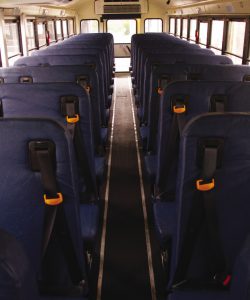By Kim Hilsenbeck
In an era of budget reductions and doing more with less, Hays CISD administrative staff and the Board of Trustees find themselves searching for cost-saving mechanisms during this budget season.
They may have found another: hire cheaper nursing staff.
But that prospect has nurses across the district speaking out against such a money-saving endeavor, saying the safety of school children is at risk.
Superintendent Mike McKie, however, who came to Hays CISD a year ago from Ft. Bend ISD near Houston, said the LVN model is widely — and successfully — used at other districts, including his former employer.
At Monday’s board business meeting, a group of nurses and several parents spoke during the open forum portion of the meeting, asking board members to not vote for the change, saying they shouldn’t find cost savings as the expense of student health safety.
The suggestion came from a proposal by the Texas Association of School Boards (TASB), which recommended the district phase out the hiring of registered nurses (RNs) as attrition occurs, such as retirement and resignations, at elementary school campuses. Those positions would be replaced by Licensed Vocational Nurses (LVNs), at a lower salary.
McKie told district employees in a letter last week, which is posted on the Hays CISD website, that no nurses would lose their jobs as a result of the proposal, should the board pass the measure when it votes on the 2014-2015 school year budget in August.
Hays CISD Nurses argue they do much more than hand out Band-Aids and check temperatures, however, most were also unwilling to be quoted for this story. Many also told the Hays Free Press they were not consulted about the proposed change in advance.
The district’s Student Health Advisory Committee (SHAC), comprised of employees, parents and community leaders, is so far noticeably mum on the issue. SHAC has previously weighed in on sex education curriculum, cafeteria food guidelines and mental health issues among students.
RNs, according to one Hays CISD school nurse, have a longer and more comprehensive educational path, more practical experience as student nurses, and have been trained to make decisions and observations in a different, more thorough way.
One middle school nurse who wrote to the Hays Free Press before the meeting said there are students with life-threatening allergies and those with diabetes who need to be more closely monitored than other students in middle school.
Another nurse said at her middle school campus, she has seen two students with ruptured spleens, several compound fractures, numerous head injuries, severe eye injury and extreme diabetic issues.
“And that is just a few [incidents] that came to the top of my head,” she wrote.
According to the Texas School Nurses Organization, RNs are licensed to perform nursing assessments and diagnosis. They can also create an Individualized Healthcare Plan for students with chronic conditions such as asthma, seizure disorders and diabetes.
Cecilia Schmidt, RN, a 34-year Hays CISD employee and a nurse for 44 years, spoke to the board during the open forum. A group of about 10 school nurses stood with her in apparent solidarity while she addressed the trustees. Schmidt provided a list of services provided last year.
“Last year we had 120,000 [WELL] Clinic visits, 40,000 meds delivered, 2,220 students with asthma, 43 diabetic students including 27 Type I who take meds during the school day, 94 students with heart problems, 124 students who experience seizures and 341 with a history of life-threatening Anaphylaxis,” Schmidt said.
She also spent several of her allotted five minutes explaining the differences between what RNs and LVNs can do. For example, she said LVNs require direct supervision in a structured work environment. LVNs also cannot prepare a care plan for students.
School board president Willie Tenorio cut Schmidt off at the five-minute mark. The Hays Free Press caught up with her outside Lehman High where the meeting took place.
Schmidt said Hays CISD has what is known around the state as “the Gold Standard” of nursing care in its schools, which is staffing every campus with an RN. Sherri McKee, RN and the nurse at Hays High School for 20 years, agreed.
But Schmidt and McKee said several local districts, including Dripping Springs, Leander and Pflugerville, tried having only LVNs at elementary schools but are now reverting back to the RN model.
“It’s a very common TASB recommendation,” Schmidt said.
She could not address why.
“It doesn’t seem like a huge cost savings to me in the long run,” she said. “What is the length of time you have to go before you see any money?”
She knows of two nurses leaving at the end of this school year.
Schmidt also touched on the perceived safety issues she and other Hays CISD nurses have should the board vote to adopt the change.
“LVNs need support with emergency situations. More students are dismissed from schools that don’t have RNs on campus,” she said, adding that RNs are able to make the determination of whether a student can stay.
Concerns from Schmidt included LVNs sending more students home without a diagnosis, which she said could impact the district’s bottom line when it comes to funding for students average daily attendance (ADA).
“So now we’re dealing with ADA,” she said.
Schmidt was quick to point out that she works with LVNs and is not making a statement about their skills or abilities, but she also acknowledged that some LVNs she knows would not necessarily want to be the sole nurse at an elementary campus.
“I don’t think any current LVNs would feel comfortable having their own school,” Schmidt said.
With the generally one-year training program for LVNs, Schmidt said they aren’t as marketable.
“Hospitals aren’t hiring LVNs anymore,” she said. “Where you find them is in long-term care facilities or home health. Their pediatric and critical care skills are really limited.”
Schmidt said she came to speak to the board so they could have a better understanding of the issues and to learn more about the tasks nurses perform, despite some of her colleagues saying the issue was already decided.
“I don’t think it is a done deal,” Schmidt said. “We wanted [the board] to make an informed decision. We trust their judgment and abilities to make that decision. And we will respect their decision.”










